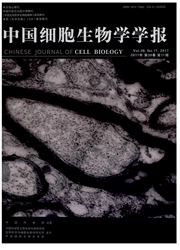

 中文摘要:
中文摘要:
探讨炎性细胞因子在慢性支气管炎小鼠肺细胞中的表达及桔梗皂苷(kikyosaponin,KS)治疗慢性支气管炎的作用机制。将50只健康小鼠分成正常对照组、模型组和桔梗皂苷低、中、高剂量组, 除正常对照组外, 其余四组动物均采用烟熏加浓氨水吸入法建立慢性支气管炎模型, 然后分别用药物进行治疗。实验结束后, 取各组小鼠肺组织进行石蜡制片, HE染色光镜观察支气管和肺组织病理形态的变化; 免疫组化分析肺细胞中IL-1β和TNF-α的表达。Western blot检测肺组织中IL-1β和TNF-α的表达。免疫组化检测显示, 与正常对照组相比, 模型组小鼠肺组织细胞中IL-1β和TNF-α的表达非常显著。在连续用药30天后, 与模型组相比, 各治疗组小鼠肺组织细胞中IL-1β和TNF-α的表达显著降低(P〈0.05, P〈0.01)。蛋白印迹术检测显示, 模型组小鼠肺组织细胞中IL-1β和TNF-α的表达水平明显增加, 与正常对照组比较, 差异十分显著(P〈0.01)。而连续用药30天后, 各治疗组小鼠肺组织细胞中IL-1β和TNF-α的表达量明显下降, 且呈较好的量效关系。结果表明, 桔梗皂苷对慢性支气管炎小鼠肺组织中炎性细胞因子IL-1β和TNF-α的表达有明显的抑制作用。推测其作用机制可能是通过抑制肺组织中炎性细胞因子和自由基的生成而达到抗炎、止咳平喘作用的。
 英文摘要:
英文摘要:
To research the expression of inflammatory cytokines of pneumonocyte of chronic bronchitis (CB) mice and study the mechanism of kikyosaponin on bronchitis treatment, fifty healthy mice were divided into five groups: normal control group, CB model group and treatment groups with low, middle and high doses of ki- kyosaponin groups. Each group of mice inhaled dense smoke and stronger ammonia water to establish a model of chronic bronchitis except the normal control group, and then respectively were treated by kikyosaponin. After the experiment, the lung tissues of mice from each group were removed for paraffin section. Pathology of bronchus andalveolar cells which stained by HE were observed under the light microscope. The expression of IL- 1β and TNF-a of alveolar cells was analyzed by immunohistochemical method and Western blot. Immunohistochemical method showed that the expression of IL-1β and TNF-a in chronic bronchitis model group increased significantly compared with the normal group. After treatment for 30 days, the expression of IL-1β and TNF-a decreased significantly in each treated group compared with the model group. Western blot showed that the expression oflL-1β and TNF-a in the model group increased significantly compared with the normal group. After treatment for 30 days, the expres- sion of IL- 1β and TNF-a decreased obviously in each treated group with dose-effect relationship. Kikyosaponin can obviously inhibit the expression of IL-1β and TNF-a in mice lung tissue. We speculate that kikyosaponin plays an important role in anti-inflammation, suppressing cough and relieving asthma through inhibition of the generation of inflammatory cytokines and free radical.
 同期刊论文项目
同期刊论文项目
 同项目期刊论文
同项目期刊论文
 期刊信息
期刊信息
